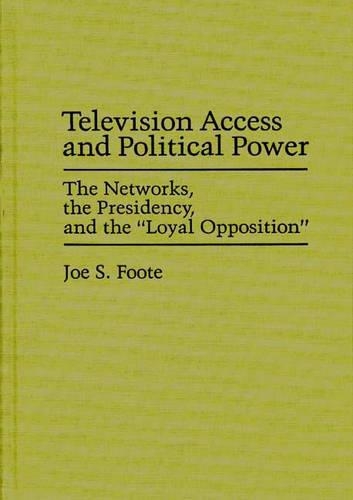
Television Access and Political Power: The Networks, the Presidency, and the Loyal Opposition
(Hardback)
Publishing Details
Television Access and Political Power: The Networks, the Presidency, and the Loyal Opposition
By (Author) Joe S. Foote
Bloomsbury Publishing PLC
Praeger Publishers Inc
30th May 1990
United States
Classifications
Tertiary Education
Non Fiction
324.730973
Physical Properties
Hardback
240
Description
This volume chronicles the 60-year history of presidential and opposition access to network television. The system has brought unprecedented exposure to twentieth century presidents but has discriminated consistently against the opposition in Congress. Networks instead have placed themselves in the role of loyal opposition, operating as the President's counterpoint. In decline, hurt by defecting audiences and advertisers, the network system is now struggling to survive into the next century. The author envisions a new order which will have a profound effect on both political communication and the balance of political power. Television Access and Politcal Power explores the 60 year history, structure, and efficiency of a network communication system which has dominated American political communication during the twentieth century. Contrary to other countries in which clear-cut rules govern the government-broadcaster relationship, American networks are free to exercise their own judgement, regardless of the consequences. The author urges reform on a system that has not worked well for either political party.
Reviews
In this thoughtful book Foote, a former press secretary for Carl Albert, then Speaker of the House, brings together an array of information about an important topic concerning the US political system--access to the news media. This volume is intended to be a sequel to N. Minow's Presidential Television. In addition, Foote's book fits nicely with a growing list of political science works exploring the causes and effects of presidential relationships with the public and the news media. Aside from a few tables in two chapters, Foote does not attempt to use empirical techniques to present new evidence. Instead, the strength of the book lies in chronicling and exploring how presidents and their opponents have battled to gain access to the television networks. The author recounts in some detail how presidents have dominated media access throughout most of this century and ends with an examination of recent trends. He also discusses shortcomings of the fairness doctrine and of the equal-time provisions in failing to help create balanced coverage between presidents and their political rivals. Recommended for both undergraduates and graduate collections.-Choice
"In this thoughtful book Foote, a former press secretary for Carl Albert, then Speaker of the House, brings together an array of information about an important topic concerning the US political system--access to the news media. This volume is intended to be a sequel to N. Minow's Presidential Television. In addition, Foote's book fits nicely with a growing list of political science works exploring the causes and effects of presidential relationships with the public and the news media. Aside from a few tables in two chapters, Foote does not attempt to use empirical techniques to present new evidence. Instead, the strength of the book lies in chronicling and exploring how presidents and their opponents have battled to gain access to the television networks. The author recounts in some detail how presidents have dominated media access throughout most of this century and ends with an examination of recent trends. He also discusses shortcomings of the fairness doctrine and of the equal-time provisions in failing to help create balanced coverage between presidents and their political rivals. Recommended for both undergraduates and graduate collections."-Choice
Author Bio
JOE S. FOOTE is presently Chairman and Associate Professor of Radio-Television at Southern Illinois University at Carbondale, Illinois. He became interested in the presidential opposition access question while press secretary to Speaker of the House Carl Albert in the early 1970s.
